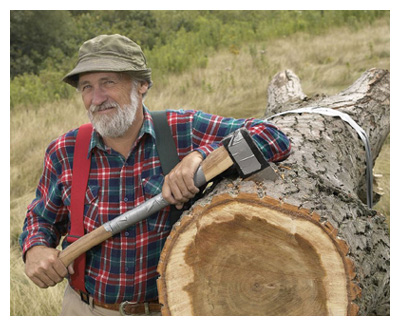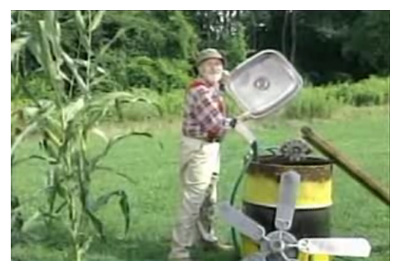Do you think of yourself as a Midwesterner? A Northerner? If you live in Chicago, author Ted McClelland would call you a Great Laker. McClelland spent last summer driving around the Great Lakes — a 9,600-mile trip that took him as far west as Duluth, Minnesota, and as far east as Kingston, Ontario — to research his upcoming book, The Third Coast, which looks at the Lakes as a distinct region of North America, with its own culture and common interests. Gapers Block is pleased to present a series of excerpts from the book over the next several months.
Hamilton, Ontario
I met one celebrity on my trip around the Third Coast. Steve Smith is not excessively famous — he made his name on the CBC — but his program, "The Red Green Show," had followed me around the Lakes. It was on every motel TV from Escanaba to Windsor. "Red Green" was an Up North cross between "Hee Haw" and "This Old House." Smith played a fishing lodge handyman who solved every Fix-it problem with a roll of duct tape. Other than SCTV, it was TV's only Canadian import, but its appeal was strongest in the Upper Midwest, where PBS stations gave it the pledge drive slot. If I had to choose the one institution that best represents Third Coast culture, I would choose "The Red Green Show."
The star's trailer was parked beside a hill at the Christie Conservation Area, a county park outside Hamilton. Inside, Smith was in full costume: beard, flannel shirt, red and green suspenders, and an out-of-shape Canadian Army field cap stained with the sweat of 15 seasons under studio lights. As I tried to take a seat, I bumped my crown on an overhang.
"That's the kind of thing that happens on your show," I said weakly.
"Except we do it on purpose," he said, in a voice much smoother than the unloading gravel truck he used for Red Green. A comedian can't resist a wisecrack, especially after a set-up like that. But then he was completely gracious. He was going over a storyboard with his director, but we could talk between shots.
"I just had three shots of you duct-taping stuff together," said the director, who wore a sweatshirt from the University of Wisconsin, where his son played hockey.
"Hey, did you know they fixed the Space Shuttle using duct tape?" Smith said. It was in the day's news. Canadian engineers had made the repairs.
"What kind did they use?" the director asked. "It's got to be stronger than our stuff."
"They've been watching too much 'Red Green.'"

Smith and his crew tromped up the hill to the set. It was a baffling agglomeration of props: stalks of corn, a trash barrel, a propeller, a lawnmower. Smith took his place behind a workbench piled with looped cords and encyclopedias.
"This is our last Red Green Handyman Corner," whispered the producer, Sandi Richardson. "Steve is turning 60, and he's ready to hang up his hat."
There was a sound problem, so Smith returned to the trailer. I followed. This time, I didn't hit my head. Smith took off his cap, and I asked him whether "Red Green" was based on a real-life Northern lodge.
"There used to be this show called 'Scuttlebutt Lodge' on CTV, with a guy named Red Fisher." He was in another character now, that of Steve Smith, Interviewee. His pitch brightened, he shifted to the edge of his bench, he capped an invisible beach ball with his hands. He knew these lines cold. "It was a fishing show, and there were episodes where he wouldn't catch any fish. They would sit there and talk about fishing trips, and he had poems, and he would read his poems on the air, and it was 'Why God Loves Moose.' I was just making fun of him. My wife and I had a sketch comedy show called 'Smith and Smith,' and I was doing this character. I wouldn't even do a script. We always had a strong response to the character. It's something I would enjoy."
After "Smith and Smith" went off the air, Smith debuted "Red Green" on a station in Hamilton. The show was cancelled almost immediately. After the sacking, the station got letters that said, "Forget the Whales, Save Red Green!"
"In Canada, a lot of TV is government-subsidized art stations. The Canadians know that, and they resent it. To get Canadians complaining about a Canadian show going off the air is amazing. Usually, they're street-dancing when a Canadian show goes off the air."
"Red Green" got another break when it was picked up by the PBS station in Detroit, which was hoping to attract viewers in Southwestern Ontario. But Michiganders love hunting, fishing and auto repair, too. "Red Green" became a regional hit: soon it was airing in Marquette, Toledo, Milwaukee and Elkhart.
"I think Canada generally is very much like the Midwest," Smith said. "The values, the work ethic. Our show is very popular in the Midwest. Iowa is our number one market. We've done PBS fundraisers, and they always come out dressed in Red Green attire. They get it. Let me show you something."
Smith led me into the trailer's office. A computer displayed a cartoon from the Des Moines Register, portraying Smith in a space suit. It was captioned "Astronaut Red Green Repairs the Space Shuttle."
There was a knock on the door. The set was ready for Red Green. But when Smith took his mark, a cornstalk blocked the camera's view.
"There's a leaf in his face that's bothering me," the director fussed. "You know the one."
"It must be Tie Domi," Smith said. "That's the one Leaf that's always in your face." (This quip never aired. As Smith puts it, "I don't shy away from Canadian, but I'm not going to tell a joke that 90 percent of my audience isn't going to get.")
An assistant snipped the stalk. They were ready to shoot. Smith picked up the books and began lecturing on man's quest for a perpetual motion machine. His jokes were as corny as his props.
"The creation of a perpetual motion machine has been the most baffling mystery the world's great scientists have ever faced. I guess they didn't have to do their own taxes. You look at the famous authors in these physics books: Galileo, Isaac Newton, Dionne Warwick. No, Sorry, that's a psychics book."
He walked over to the pile of junk.
"All you need is stuff you probably have lying around: a gas lawnmower, a downspout, a car alternator, a 45-gallon drum, a ceiling fan, a chunk of garden hose and some corn stalks. You're probably saying, 'Jeez, Red, you're using everything but the kitchen sink.'"
Smith stepped behind the drum, bent over, and lifted a sink with a dangling drain. "Well, you're wrong."

The director squeezed off a few frames of Smith struggling with a roll of duct tape. Then there was a long break, while the crew lashed the junkyard cast-offs into a Rube Goldberg contraption.
The joke of "Handyman's Corner" is that Red's fix-it schemes never work. Boilers explode. Cars break down. Smith uttered Red's most famous line — "So remember, if the women don't find you stunningly handsome they should at least find you brilliantly handy." — and prepared to start his perpetual motion machine. He pulled the lawnmower cord. The engine didn't catch. He adjusted the choke. Still nothing. He pulled and pulled and pulled, feigning exhaustion, until the director yelled cut. "And there you have it," the director said. "The last Handyman's Corner. Now if you just wait a minute, I have some champagne. Steve's gonna pop the cork."
Smith struggled as mightily with that bottle as Red Green had with the lawnmower. "It's a duct-taped cork," he cracked.
Finally, the stopper popped free and soared over the crew.
"I wanted to end with a perpetual machine," Smith said, as everyone drank a toast from plastic stemware. "I've been saving this one for five years. People have been sending me ideas, but this one's all mine."
Read on:
1. Sheboygan & Manitowoc County, Wisconsin
2. Marquette, Michigan
3. Mackinac Island, Michigan
4. Grand Marais, Minnesota
5. Pays Plat First Nations Reserve, Ontario, Canada
6. Isle Royale, Michigan
7. Rogers City, Michigan
8. Toronto, Canada
9. Hamilton, Ontario
10. Hamburg, New York
Buy the book.





